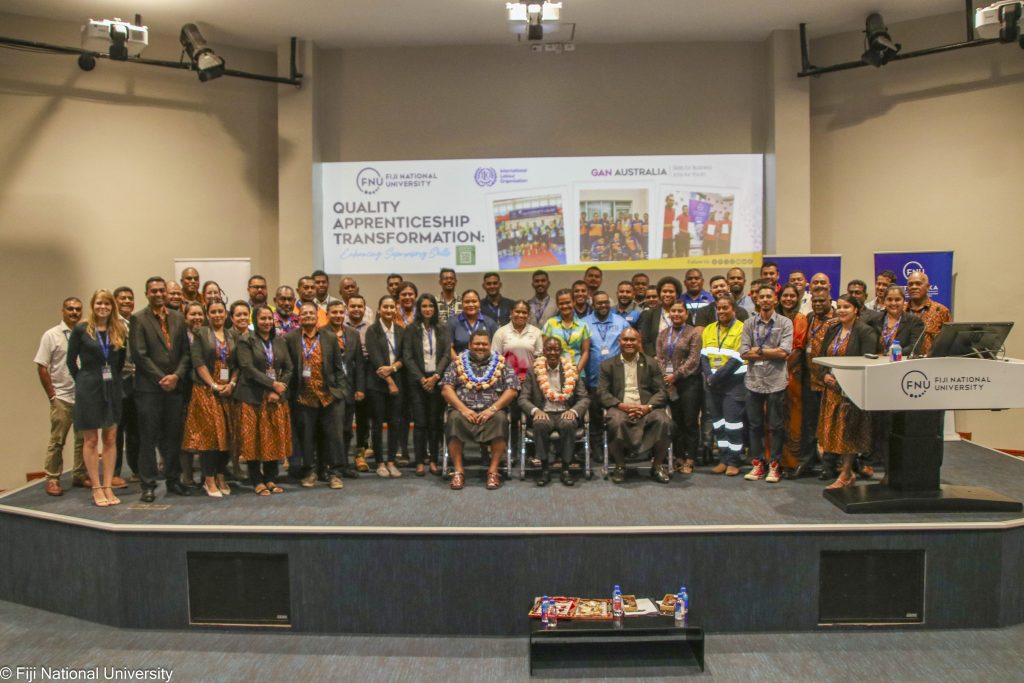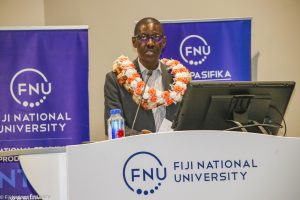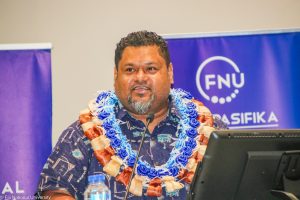

Participants at the official opening of the Inaugural Training Session
The Fiji National University’s (FNU) National Training and Productivity Centre (NTPC) hosted its inaugural session on “Quality Apprenticeship Transformation: Enhancing Supervisory Skills” yesterday.
The event, attended by Edward Bernard, CEO of the Fiji Commerce & Employers Federation (FCEF), was officially opened by Martin Wandera, Director of the International Labour Organization (ILO) Office for Pacific Island Countries.

Martin Wandera, Director of the International Labour Organization (ILO) Office for Pacific Island Countries
In his keynote address, Wandera underscored the significance of apprenticeships in human capital development, describing them as a transformative means of turning potential into capability and driving economic growth through skills and innovation.
“Apprenticeships are the oldest public-private partnership in history and, when considering informal apprenticeships, continue to be the most widespread form of training globally,” said Wandera.
Highlighting their relevance to the Pacific, he added, “In the Pacific region, where communities are bound by resilience and tradition, apprenticeships represent a bridge to the future by connecting the aspirations of young people with the evolving demands of the global economy.”
Wandera also reaffirmed the ILO’s commitment to advancing quality apprenticeships in partnership with FNU. He noted the ILO’s advocacy since 2012, which led to the adoption of Recommendation 208 (R208) on “Quality Apprenticeships” at the International Labour Conference in 2023.
“The present pilot training reflects this commitment, as it is based on a range of ILO technical tools developed by our colleagues in Geneva to support our constituents worldwide in strengthening their apprenticeship systems following the adoption of R208 in 2023,” Wandera said.
He stressed the importance of quality teaching and mentoring within apprenticeship programmes, recognising supervisors as critical mentors and role models for apprentices.
FCEF CEO Edward Bernard urged participants to not only address current skills gaps but also anticipate future workforce demands.

Edward Bernard, Chief Executive Officer, Fiji Commerce and Employers Federation (FCEF)
He highlighted the importance of fostering a culture of lifelong learning, saying, “The ILO Recommendation 208 on Quality Apprenticeships mentions about 20 measures member states can take and one that I think is critical for Fiji, now and for the future is – ‘Members should promote a culture of lifelong learning, skilling, reskilling and upskilling, including with respect to core skills.’ Apprenticeships and Internships work and FCEF is committed to and is advocating for doing more in this space.”
FNU’s Pro-Vice-Chancellor TVET, Dr Isimeli Tagicakiverata, noted the institution’s longstanding apprenticeship scheme, which has trained over 9,300 apprentices over 61 years. Currently, 432 apprentices are in training, with plans to register an additional 100 by year-end, exemplifying FNU’s collaboration with the ILO to improve apprenticeship quality in Fiji.